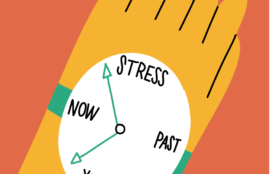 For many of us, decluttering serves as a sort of mental palette cleanser. Stressed out? Tidy your apartment. Unfocused and frazzled? Clear the mess on your desk. Down in the dumps? Reorganize your closet for a sense of accomplishment.
For many of us, decluttering serves as a sort of mental palette cleanser. Stressed out? Tidy your apartment. Unfocused and frazzled? Clear the mess on your desk. Down in the dumps? Reorganize your closet for a sense of accomplishment.
It turns out there’s plenty of science behind this sentiment. “Our brains can process information more clearly and efficiently in an organized space,” said Manhattan-based psychotherapist Dana Dorfman. “Human beings like to feel in control of themselves and of their surroundings. We prefer predictable environments that provide a sense of stability and calm.”
A deep clean can also help you let go of certain things—a particularly appealing benefit as we stare down 2020. “Possessions represent the emotions or experiences attached to them,” she adds. “A cluttered or disorganized accumulation of possessions may make it difficult to ‘move on’ from the past or live in the present.”
Whether you’re decluttering to start a new chapter or you simply appreciate an orderly apartment, here’s what you can expect from a mental health perspective.
After One Day
“On day one, people can experience a range of emotions—from overwhelming sadness to relief to invigoration,” notes Dorfman. But no matter what the nature of your project, she adds that you’ll most likely feel energized and motivated as the day progresses. Because organizing involves problem solving and decision-making, people feel a sense of mastery and accomplishment.
While the presence of a mess may overload all of the senses, it impacts the visual field most significantly. “When the visual field is cluttered, the brain must ‘sift through’ everything and weed out the interfering stimuli,” Dorfman explains. “Studies show that people experience a significant decrease in the stress hormone cortisol when items are removed,” helping you to feel more stable, clearheaded, and relaxed as you clean.
After One Week
 Believe it or not, you may find yourself looking for your next organizational project after just seven days or so. “System creation can provide ongoing motivation—it builds on itself,” Dorfman notes. “If you design an entryway space equipped with a place for your coat, keys, and bag, you’ve mitigated future misplacements. The sense of mastery and competence prompts the mind to want more.”
Believe it or not, you may find yourself looking for your next organizational project after just seven days or so. “System creation can provide ongoing motivation—it builds on itself,” Dorfman notes. “If you design an entryway space equipped with a place for your coat, keys, and bag, you’ve mitigated future misplacements. The sense of mastery and competence prompts the mind to want more.”
With that said, your new lifestyle may take some getting used to, both on a personal and practical level. It can take time for the brain to adapt to a fresh environment and you just might forget where certain items are, for example. But there are additional benefits: “This change may require an updating of one’s self-narrative,” adds Dorfman. “If you’ve always identified as a ‘messy’ person, you may view your habits and capabilities in a new light.”
After Three Months
In addition to feeling less stressed, less overwhelmed, and more in control, sticking to an organizational system may lead to newfound feelings of capability and empowerment. “Conquering a procrastinated task like cleaning may remind a person that the anticipation is usually worse than the reality,” explains Dorfman. “This realization and resulting sense of competence can flow into other areas of your life.”
Above all else, most research indicates that it is simply beneficial to live in a consistently neat and organized space. Any steps you take toward curating a healthy environment for yourself are well worth the effort. That’s one compelling reason to do a deep clean and donate unwanted items before the year’s end.
Original article here






















Sorry, the comment form is closed at this time.